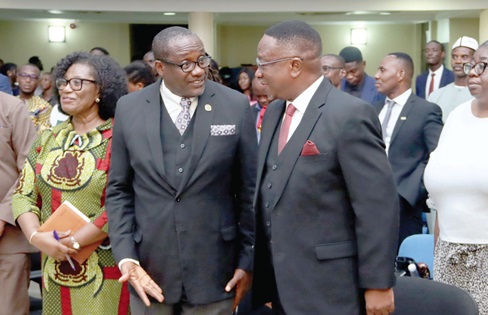A Professor of Law at the University of Cape Coast (UCC), Philip Ebow Bondzi-Simpson, has called for a fairer, more objective approach to public sector pay to correct the widespread salary disparities across the country’s public service.
That, he said, was because the current “multiple-spine” salary system was confusing, inequitable, and prone to unjustified variations across and within sectors.
Prof. Bondzi-Simpson explained that the present compensation regime had created anomalies where public officers with similar qualifications and experience received varying salaries simply based on the institutions or services they belonged to.
He cited examples where officers in statutory commissions earned more than their counterparts in constitutional bodies, and where senior public servants earned less than their colleagues with similar or even lower responsibilities.
“Some public service officers earn more than the ministers they report to.
Others doing the same work are paid differently simply because they belong to different services,” he lamented.
Lecture
Prof. Bondzi-Simpson made the proposal during a public lecture in Accra last Wednesday.
His presentation was on the theme: “A Regime of Public Sector Compensation — A Restatement of the Concept.”
The lecture, organised by Central University, was chaired by its Vice-Chancellor, Prof. Bill Buenar Puplampu, and attracted academics, policymakers, public servants, and students.
The law professor cited the 2016 report by Dr Mac-Anthony Cobblah, which showed that the least paid public sector worker on the Single Spine Salary Structure earned only one per cent of what a Member of Parliament took home monthly which further indicated that, that worker would have to work for more than seven years to earn what an MP earns in a month.
The persistent pay distortions, he believed, had led to negative practices in the public sector, including moonlighting, internal migrations from lower-paying to higher-paying services, labour unrest, and attrition.
Alternative regime
To remedy the situation, Prof. Bondzi-Simpson proposed a comprehensive and integrated public sector salary regime based on four main factors: qualifications, experience, job description, and hierarchical status (rank and office).
Under the proposed framework, there would be 20 levels of educational qualification and 42 steps for experience, with salaries rising proportionately along these scales.
Under his model, public workers would be placed on a fair and transparent grid based on the minimum qualification required for their role and the years of relevant experience they bring.
Promotion within the service would follow a clearly defined path tied to performance, education, and leadership responsibility.
He suggested a ten-step structure for both, with higher roles requiring higher ranks and attracting additional negotiated pay to ensure fairness and reward both achievement and responsibility.
Additionally, the proposed model includes inducements for those who accept postings to underserved or high-risk areas.
To further promote equity, he recommended public sector salaries be indexed to inflation, the earnings of Article 71 office holders, and average private sector salaries.
He cited Singapore as an example, where ministerial salaries are pegged to two-thirds of what their private sector equivalents earn.
No amendments
Prof. Bondzi-Simpson stressed that his proposed reforms did not require any constitutional amendments or new statutory enactments.
Rather, they just needed political will and executive support to be implemented.
He also highlighted the need to establish an Independent Emoluments Committee, a recommendation that has featured in multiple reports—including those by Prof. Ewurama Addy (2011), the Fiadzoe Constitutional Review Commission (2011), and Prof. Dora Edu-Buandoh (2016).

